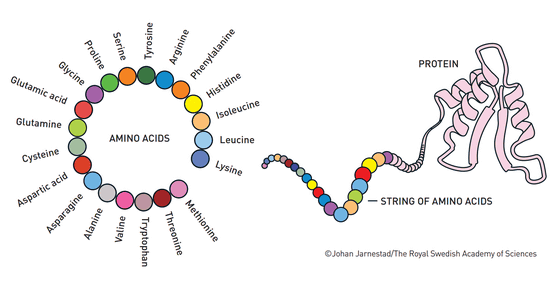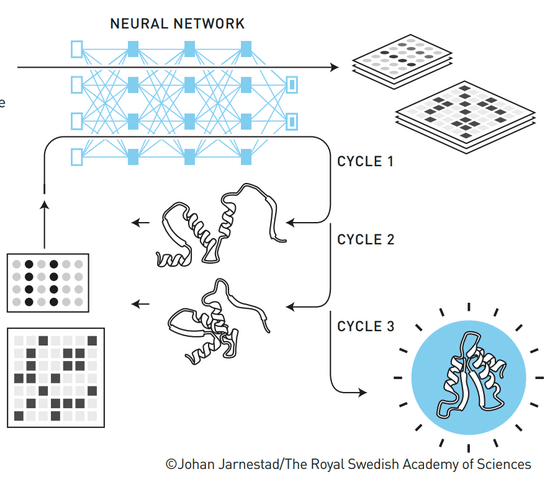Google DeepMind co-founder Demis Hassabis and others win Nobel Prize in Chemistry, highly praised for research on protein structure prediction AI such as 'AlphaFold'

By George Gillams
The Royal Swedish Academy of Sciences announced that the 2024 Nobel Prize in Chemistry will be awarded to Professor David Baker of the University of Washington, Demis Hassabis, founder of Google DeepMind, and John M. Jumper, senior research scientist at Google. The award was given for 'computational protein design and protein structure prediction,' in recognition of their work on large-scale computational protein design and structure analysis, and AI-based protein structure prediction.
Press release: The Nobel Prize in Chemistry 2024 - NobelPrize.org
https://www.nobelprize.org/prizes/chemistry/2024/press-release/
BREAKING NEWS
— The Nobel Prize (@NobelPrize) October 9, 2024
The Royal Swedish Academy of Sciences has decided to award the 2024 #NobelPrize in Chemistry with one half to David Baker “for computational protein design” and the other half jointly to Demis Hassabis and John M. Jumper “for protein structure prediction.” pic.twitter.com/gYrdFFcD4T
Proteins are molecules with complex structures that consist of chains of 20 different amino acids. Proteins control all the chemical reactions that are the basis of life, such as hormones, signaling substances, and antibodies, and also function as building blocks of various tissues.
However, the key to protein development is its structure. Proteins have a three-dimensional structure when amino acids linked together like long strings are folded, and this structure has a major impact on the function of the protein. The amino acid sequence itself can be known from genome analysis of DNA and RNA, which serve as blueprints, but it has been extremely difficult to predict what structure will result when such a long amino acid chain is folded.

Professor Baker succeeded in designing a new protein from amino acids in 2003. Since then, he has been developing proteins that can be used in medicines, vaccines, nanomaterials, and miniature sensors.
Improving Protein Expression, Stability, and Function with ProteinMPNN | Journal of the American Chemical Society
https://pubs.acs.org/doi/10.1021/jacs.3c10941
One of the most well-known projects led by Professor Baker is Rosetta@home , a volunteer project that uses computer processing power around the world to analyze protein structures in order to study protein structure prediction.
Review of 'Folding@home' and 'BOINC' that can help analyze the new coronavirus using the computing resources of your own PC - GIGAZINE

Then in 2018, DeepMind, then a sister company of Google, developed 'AlphaFold,' an AI-based prediction system for protein three-dimensional structures based on gene sequence information.
Artificial intelligence company DeepMind develops 'AlphaFold' to predict protein three-dimensional structures - GIGAZINE

DeepMind continued its research and announced 'AlphaFold 2' in 2020, declaring that it had solved the folding problem , which is a challenge in protein structure analysis. It is now possible to predict the structures of almost all of the more than 200 million proteins that have been identified so far.
DeepMind's 'AlphaFold' uses the power of AI to show the way to a 50-year-old super-difficult problem in biology, accelerating research - GIGAZINE

The advent of AlphaFold has made it easier to predict protein structure, facilitating the development of new drugs and the invention of new enzymes. The Royal Swedish Academy of Sciences commented, 'Without proteins, life would be impossible. The ability to predict protein structure and design unique proteins is of the greatest benefit to humanity.'

The Nobel Prize ceremony will be held in Oslo, Sweden on Tuesday, December 10, 2024. The prize money is 11 million Swedish kronor (approximately 158 million yen), half of which will be shared by Professor Baker and the other half by Hassabis and Jumper.
The 2024 Nobel Prize in Physics has been awarded to Professor Emeritus John J. Hopfield of Princeton University and Professor Emeritus Geoffrey Hinton of the University of Toronto for 'fundamental discoveries and inventions enabling machine learning with artificial neural networks'. Like the Nobel Prize in Chemistry, the award is for AI-related research.
Two researchers who proposed the foundations of AI and machine learning using artificial neural networks win Nobel Prize in Physics - GIGAZINE

Related Posts:






